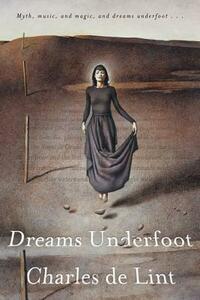Take a photo of a barcode or cover
dark
emotional
funny
hopeful
lighthearted
mysterious
sad
slow-paced
This is a strong overall collection. There weren't any obvious weak links, although the first story in the collection seems like the odd man out, since it's not set in Newford, but it's still a good story.
emotional
hopeful
mysterious
reflective
medium-paced
Plot or Character Driven:
Character
Strong character development:
Yes
Loveable characters:
Yes
Diverse cast of characters:
Yes
Flaws of characters a main focus:
Complicated
adventurous
challenging
dark
emotional
funny
hopeful
informative
inspiring
lighthearted
mysterious
reflective
relaxing
sad
tense
medium-paced
Plot or Character Driven:
A mix
Strong character development:
Yes
Loveable characters:
Yes
Diverse cast of characters:
Yes
Flaws of characters a main focus:
Complicated
dark
emotional
reflective
slow-paced
Plot or Character Driven:
Character
Strong character development:
Complicated
Loveable characters:
Complicated
Diverse cast of characters:
No
Flaws of characters a main focus:
Yes
Newford is DeLint's fictional Canadian city, where there seems to be a strong connection between the "real" world and the fantastical world of the fey, or the never-never. The stories here take place in or near Newford, and there are a group of characters who appear in more than one story. Jilly Coppercorn is probably the most frequent character.
DeLint tends to center his stories around a few types of characters, mostly creative types (artists, musicians, dancers, etc...) and street people. He strongly suggests that these people would be more receptive to seeing the alternate realities that more conventional people have denied, and thus shut off from their experience. I think this pre-occupation limits DeLint's scope in his writing, but within those limits, he is excellent and I thoroughly enjoyed these stories.
My favorites were Our Lady of the Harbour, which is a contemporary retelling of The Little Mermaid, in which the Prince is a fine traditional musician who is socially retarded, perhaps because of his obsession with his music; and Time Skip and Paperjack, a pair of time travel stories involving lost love. I found all three of these stories to be quite beautiful and moving.
In general, the stories range from being slightly above average to excellent. They tend all to involve people who are either first introduced to the magic, or who have magical experience challenges their skepticism. DeLint comes up with many different ways to approach this same theme. They are so different that it becomes difficult to comprehend what rules, if any, there are to the magical underlay of Newford itself. You get the feeling that anything magical could happen there - which is both cool and kind of a weakness.
In an interview I was with De Lint, he says that he has basically two rules for the magic that he uses in stories. First, using magic must always have a cost. And Second, the magic can never solve real world problems. Thus, no Harry Potter battles where people are endlessly firing off spells. And if there is a problem in a relationship or with an enemy, magic won't solve that problem in any kind of deus ex machina. He definitely follows those rules here, and this tends to make the stories quite poignant. People gain a sense of wonder in several of them, but that doesn't mean that their problems have necessarily resolved as they might have wanted. The nice thing about his approach to magic is that it feels magical, and not like some kind of alternate physics. It also tends to put most of the magical elements beyond the conscious control of the characters. It tends to be more something that they need to deal with than something they actively manipulate.
I've already picked up four other books by De Lint, so I will definitely be reading more.
DeLint tends to center his stories around a few types of characters, mostly creative types (artists, musicians, dancers, etc...) and street people. He strongly suggests that these people would be more receptive to seeing the alternate realities that more conventional people have denied, and thus shut off from their experience. I think this pre-occupation limits DeLint's scope in his writing, but within those limits, he is excellent and I thoroughly enjoyed these stories.
My favorites were Our Lady of the Harbour, which is a contemporary retelling of The Little Mermaid, in which the Prince is a fine traditional musician who is socially retarded, perhaps because of his obsession with his music; and Time Skip and Paperjack, a pair of time travel stories involving lost love. I found all three of these stories to be quite beautiful and moving.
In general, the stories range from being slightly above average to excellent. They tend all to involve people who are either first introduced to the magic, or who have magical experience challenges their skepticism. DeLint comes up with many different ways to approach this same theme. They are so different that it becomes difficult to comprehend what rules, if any, there are to the magical underlay of Newford itself. You get the feeling that anything magical could happen there - which is both cool and kind of a weakness.
In an interview I was with De Lint, he says that he has basically two rules for the magic that he uses in stories. First, using magic must always have a cost. And Second, the magic can never solve real world problems. Thus, no Harry Potter battles where people are endlessly firing off spells. And if there is a problem in a relationship or with an enemy, magic won't solve that problem in any kind of deus ex machina. He definitely follows those rules here, and this tends to make the stories quite poignant. People gain a sense of wonder in several of them, but that doesn't mean that their problems have necessarily resolved as they might have wanted. The nice thing about his approach to magic is that it feels magical, and not like some kind of alternate physics. It also tends to put most of the magical elements beyond the conscious control of the characters. It tends to be more something that they need to deal with than something they actively manipulate.
I've already picked up four other books by De Lint, so I will definitely be reading more.
There's stories and then there's stories. The ones with any worth change your life forever, perhaps only in a small way, but once you've heard them, they are forever a part of you. You nurture them and pass them on, and the giving only makes you feel better. The others are just words on a page.
A charming collection of short stories falling firmly in that urban fantasy / myth / horror category I so enjoy. All are featured around the fictional town of Newford and the otherworldly occurrences and residences within, all written between the late 80s and early 90s. It's a diverting enough read (reminding me astoundingly of the early Welcome to Nightvale podcast episodes) though certain stories have not aged well AT ALL.
Update - losing a star 8 months on because this collection has not stuck in my mind in the slightest.
A charming collection of short stories falling firmly in that urban fantasy / myth / horror category I so enjoy. All are featured around the fictional town of Newford and the otherworldly occurrences and residences within, all written between the late 80s and early 90s. It's a diverting enough read (reminding me astoundingly of the early Welcome to Nightvale podcast episodes) though certain stories have not aged well AT ALL.
Update - losing a star 8 months on because this collection has not stuck in my mind in the slightest.
emotional
mysterious
reflective
medium-paced
This felt like the literary equivalent of putting on a flannel shirt, lying on old carpet, and listening to Nirvana with your eyes closed. It is so evocative of 90s grunge that it's hard to enjoy in 2020 (though I admittedly suspect I am just too young to have this grunge nostalgia).
The stories themselves are just interesting enough to keep you going, but not interesting enough to make you care or even think about them much after you've finished one. It was all very bland and ethereal. The first few stories seemed very focused on are fey folk real or are they not, which was kind of interesting, but then you realize they are definitely real but you aren't going to learn anything more about them, and that was so disappointing to me. The stories lacked any kind of substance.
The stories themselves are just interesting enough to keep you going, but not interesting enough to make you care or even think about them much after you've finished one. It was all very bland and ethereal. The first few stories seemed very focused on are fey folk real or are they not, which was kind of interesting, but then you realize they are definitely real but you aren't going to learn anything more about them, and that was so disappointing to me. The stories lacked any kind of substance.
I absolutely loved this book. The book's genre is urban fiction/magic realism, and while reading this book I felt all my beliefs reaffirmed that magic truly does exist in our day to day lives. Just that most people have lost touch with it in the hustle of their daily routines. Each story is beautifully written, some heartbreaking. There is so much detail in every single character and in the world of Newford, everything is flawlessly interconnected. I think that the author has captured magic and solidified in the form of this book to share with everyone to see.






